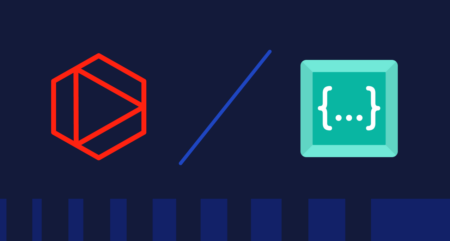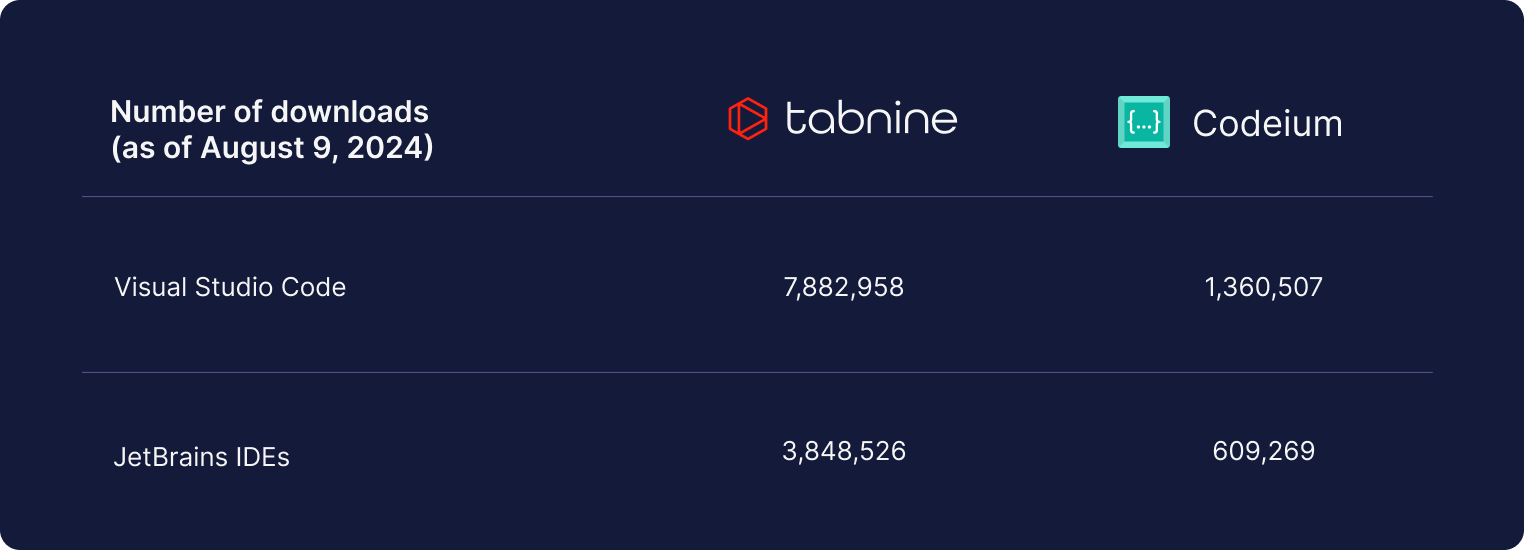Table of contents

Tabnine and Codeium are AI code assistants. Both products offer AI-powered chat and code completions to accelerate the software development life cycle and support common use cases such as planning (i.e., asking general coding questions or better understanding code in an existing project), code generation, explaining code, creating tests, fixing code, creating documentation, and maintaining code.
However, Tabnine offers significant advantages over Codeium. Unlike Codeium, Tabnine gives you total control over its AI code assistant:
This blog post goes through each of the differences between these products in detail, demonstrating why we believe that Tabnine is the ideal choice for enterprises and individual developers.
Codeium is a relatively new product (released in late 2022), which is reflected by its significantly lower product downloads and users, and the state of its product docs and support.
Tabnine is the originator of the AI code assistant category, having introduced our first AI-based code completion tool for Java in the IDE in June 2018. Tabnine is now the leading AI code assistant on the market with a million monthly active users. This enables us to gather feedback from a vast number of users and make continuous improvements and refinements to the product.

GDPR, one of the strictest data privacy laws in the world, is a must-have for AI code assistants as it reflects a company’s strong commitment towards data protection and privacy. Codeium is not GDPR compliant, making it difficult for companies based in the EU or global companies that have customers in the EU to use it.
Codeium also lacks ISO 9001 compliance, a globally recognized standard for quality management that demonstrates a company’s commitment to maintaining high quality, meeting customer expectations, and improving performance.
Tabnine offers key compliances like SOC 2 Type 2, GDPR, and ISO 9001 to ensure the security and privacy of your data.
In AI context is everything. To increase the effectiveness of AI code assistants, it’s imperative to provide contextual awareness to the LLMs so that they can understand the subtle nuances that make a developer and organization unique. Without this context, AI code assistants provide recommendations that are often generic and not tailored to a developer’s needs.
Codeium gains the context by leveraging many sources of information, such as locally available data in the IDE, company codebases, and by fine-tuning the model. However, Codeium’s Chat considers the context only for a handful of operations. Context is not available when using Codeium Chat for performing refactoring, explaining, or generating docstring operations, thus reducing the relevancy and accuracy of the results.
Tabnine leverages locally available data in the developer’s IDE, including variable types used near the completion point in the code, comments you’ve added, open files you’ve interacted with, imported packages and libraries, open projects, and many more sources as shown in the image below. We’ve seen that personalized AI recommendations based on awareness of a developer’s IDE are accepted 40% more often than AI suggestions generated without these integrations.
Tabnine administrators can connect Tabnine to their organization’s git repositories (e.g., GitHub, GitLab, BitBucket) to significantly increase the context and get highly personalized results when completing code, explaining code, creating tests, writing documentation, and more.
Tabnine also offers model customization to further enrich the capability and quality of the output. We use your codebase to fine-tune the proprietary models that we purpose-built for software development teams. Model customization is extremely valuable when you have code in a bespoke programming language or a language that’s underrepresented in the training dataset, such as System Verilog.
Codeium has its own proprietary models for chat and code completions. Codeium mentions that they don’t train their models on repositories with nonpermissive licenses to remove issues with IP infringement. Codeium doesn’t offer indemnification against IP violations for any and all generated code.
Tabnine eliminates concerns around IP infringement from the get-go. We’ve trained our proprietary models (Tabnine Protected 2 for Chat, and the universal model for code completion) exclusively on permissively licensed code. This ensures that the recommendations from Tabnine never match any proprietary code and removes any concerns around legal risks associated with accepting the code suggestions. Unlike Codeium, we’re transparent about the data that was used to train our proprietary model and share it with customers under NDA. Additionally, we offer an IP indemnification to enterprise users for peace of mind.
Codeium uses its proprietary model to power its AI chat. Additionally, they plan to introduce support for GPT-4.0 and Llama models for Chat. (This capability is in Beta and is not widely available). These limited model options prevent users from leveraging the new and powerful models as they become available.
Tabnine currently offers users eight different model choices for Tabnine Chat: two custom-built, fully private models from Tabnine; Open AI’s GPT-4o, GPT-4.0 Turbo, and GPT-3.5 Turbo; Anthropic’s Claude 3.5 Sonnet; Cohere’s Command R+; and Codestral, Mistral’s first-ever code model. This flexibility enables users to pick the right model based on their use case or a project. For projects where data privacy and legal risks are less important, you can use a model optimized for performance over compliance. As you switch to working on projects that have stricter requirements for privacy and protection, you can change to a model like Tabnine Protected 2 that’s built for that purpose.
Enterprises have complete control when selecting models that power Tabnine Chat. Tabnine admins can choose any specific models from the list of available LLMs and make them available to their teams. They can also connect Tabnine to an LLM endpoint inside their corporate network if needed.
Many new, powerful LLMs were released in the first half of 2024 alone: OpenAI’s GPT-4o, Anthropic’s Claude 3.5 Sonnet, and Cohere’s Command R+ to name a few. At Tabnine, we’re committed to adding support for new, state-of-the-art LLMs as they become available. This prevents LLM lock-in, future-proofs your AI strategy, and enables you to take advantage of all the innovation happening in this space.
The table below summarizes the differences between Tabnine and Codeium. Both products support common use cases such as code generation, creating documentation, generating tests, and more. However, if you need an AI code assistant that gives you complete control over data privacy, personalization, protection from IP infringement issues, and the freedom to choose the right LLM for your use case, then you should consider Tabnine.

Tabnine is honored to be recognized in Gartner® Critical Capabilities for AI code assistants, which focused “on 14 critical capabilities that align with the five most common Use Cases in AI-augmented development.” Gartner® evaluated 12 vendors, and here’s how Tabnine ranked.
Tabnine is ranked first for:
Tabnine is ranked second for:
Omdia recognized Tabnine in Omdia’s Market Radar for AI-Assisted Software Development.
Tabnine’s position as a leader in this space was recently reinforced as we were featured as a luminary in Everest Group’s Innovation Watch Assessment for Generative AI Applications in Software Development. Everest Group — a world-renowned research firm that provides strategic insights on IT, business processes, and engineering services — assessed 14 leading providers of generative AI solutions for software development for this report. The assessment framework evaluated each provider on four criteria (Scale, Level of maturity, Partnerships, and Investments) and segmented them into four categories (Luminaries, Fast Followers, Influencers, and Seekers). Tabnine performed exceptionally well in the entire assessment framework and is recognized as a Luminary. Codeium, on the other hand, was categorized as a Seeker.

Check out our Docs or contact us to schedule a demo with a product expert. If you want to try it out for yourself today, sign up here to try it free for 90 days.